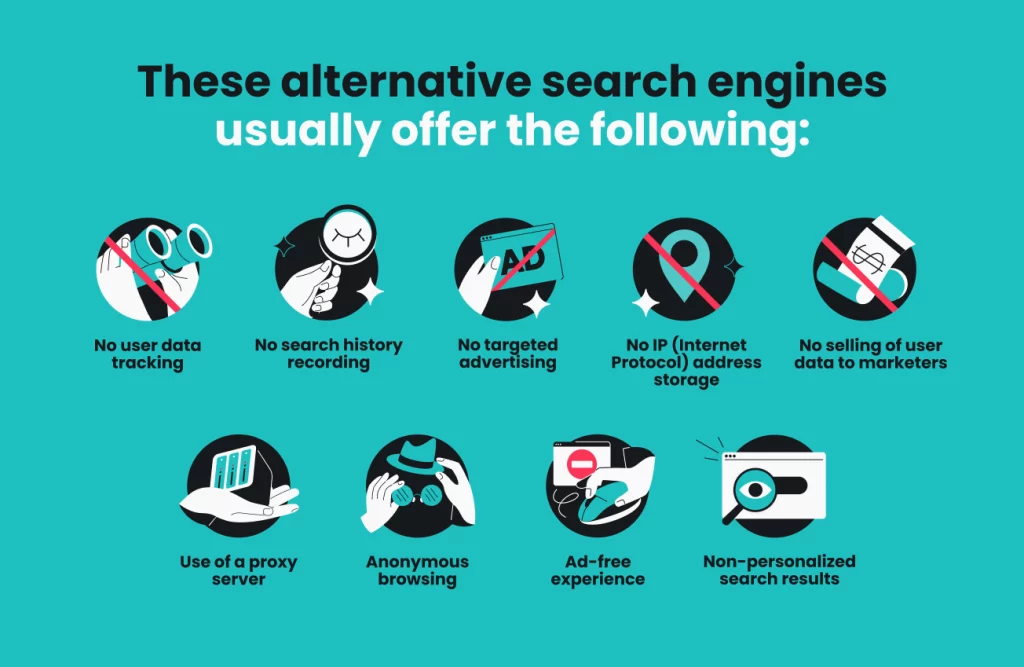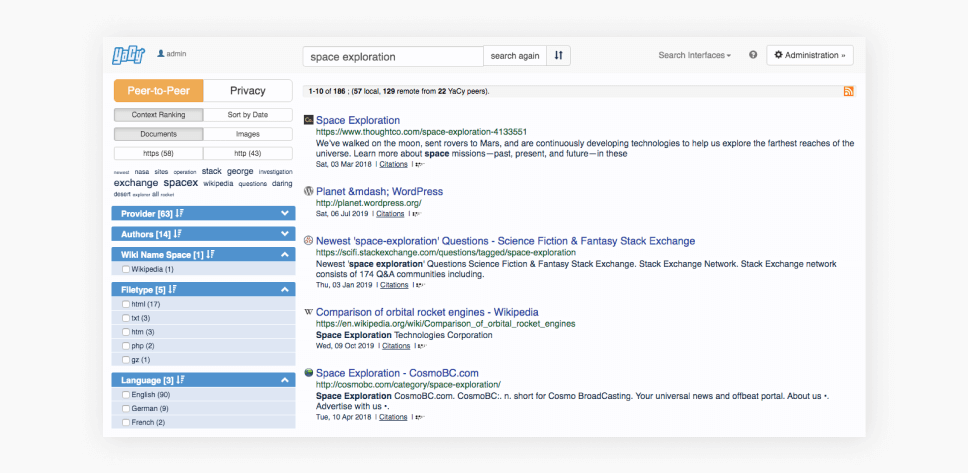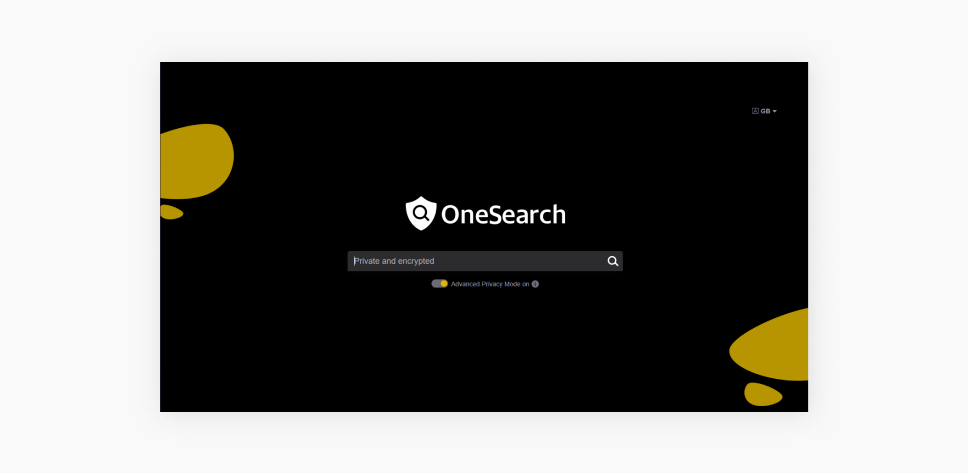
Google’s a lot like a supermarket cashier who rings you up when you buy that awkward item — sooner or later, it’s gonna see something you’d rather keep private.
That’s where private search engines step in. Not only do these alternatives to Google steer clear of your personal data, but they also provide more organic search results.
What are private search engines, and which ones are the best Google substitutes you should consider? Prepare to go incognito with our in-depth review.
Table of contents
What is a private search engine?
A private search engine is a search engine that doesn’t store user data or track your browsing history. Traditional search engines like Google rely on storing personal information to create user profiles and targeted ads. Privacy-focused search engines don’t.
Instead, they aim to provide an unbiased search experience without eavesdropping on your online activities — often with tracker blocking, search encryption, or an anonymous view feature.
These alternative search engines usually offer the following:

Beyond these features, private search engines can also come with diverse benefits such as:
- Dedicated apps;
- Browser plug-ins;
- A map functionality, à la Google Maps;
- A search results page that resembles Google’s;
- The ability to make it your default search engine.
Why should you use a private search engine?
There are numerous reasons why you should use privacy-focused alternative search engines to Google:
- Get more organic searches: these tools generate search results that are more accurate and are based only on your search queries, not any user profiles. Google searches spew out results based on sponsorships, browsing data, and your IP address. The best alternative search engines don’t;
- Enjoy greater online privacy: tracking users and employing targeted advertising are vital for Google’s business. Not so for privacy-oriented search engines. You can browse freely without having to worry about anyone collecting your search history, user preferences, or any other personal data;
- Improve data security: alternative search engines to Google allow for a safer browsing experience. Fewer ads minimize the risk of exposure to malware or phishing ads. Also, using a web search engine that emphasizes user privacy is a solid option for shielding vulnerable groups, like younger users who may be unaware of the dangers of sharing private info online;
- Surf more smoothly: mainstream search engines can bog down your browsing with trackers, personalized ads, and location-based results. Leveraging private search lets users bypass all kinds of filters and access more content that isn’t needlessly biased or censored.
Can you trust private search engines?
You can trust private search engines with some due diligence.
Check their developer, policies, and history. Many search engines state outright whether or not they use or collect user data. Look up their track record to see if they stand by their words or have been involved in any shady business.
And dig into their reputation as well. Don’t just focus on what the private search engine claims about itself, but also find out what people say in the media, within online communities, and on social media platforms. In particular, head to sources focused on tech, privacy, and consumer advocacy to get up to speed on a given Google alternative.
14 best private search engines
Google alternative search engines, and you’ll see that the market’s filled with all sorts of private tools seemingly offering everything under the moon. Which can you trust? Here are the best private search engines out there:
-
Surfshark Search

Surfshark Search was built from the ground up with privacy in mind. It gives purely organic results and doesn’t collect any personal data. Other search engines may still show ads based on your search terms, but this one lets you browse without any ads whatsoever.
On top of this, Surfshark Search offers easy access to results from different regions. All you have to do is choose your desired region from a drop-down menu next to the search bar. Some alternatives have a similar feature, but you’ll have to spend time fiddling with their parameters.
Surfshark Search also stands out because it’s developed by a reputable cybersecurity company and comes included in the broader Surfshark One suite. It’s bundled with VPN, Antivirus, and Alert, so users can take advantage of more than private search alone.
Pros | Cons |
|---|---|
100% ad-free | Paid (though with Surfshark’s robust online privacy protections, it’s likely worth the investment) |
Simple region-swapping | |
Included in an all-in-one cybersecurity bundle |
-
DuckDuckGo

Currently processing about 100 million daily searches, DuckDuckGo is one of the most popular alternative search engines to Google. It collects information from about 400 sources, but mostly Bing, to provide relevant, non-personalized search results while maintaining user privacy.
While DuckDuckGo is safe to use, it’s worth knowing that the search engine is monetized in two ways. First, it collects ad revenue through Microsoft’s advertising network. Users see ads, but they’re based on their specific search queries, not personal data. Second, it earns commissions through affiliate links. If a user clicks on an eBay or Amazon link and makes a purchase, DuckDuckGo gets a small piece of the pie.
Apart from a private search experience, DuckDuckGo also offers some nifty extras. Its bangs feature instantly gives you search results from another page — like Wikipedia — without visiting that page first. A mobile app, web extensions, and private browser are also available.
Pros | Cons |
|---|---|
Well-established | Ads still present |
Large user base | Relies heavily on Bing |
Has a custom crawler | Search results often miss obvious sources |
-
Startpage

Startpage traces its roots back to 2002, making it one of the older alternative search engines. It’s headquartered in the Netherlands, meaning it operates under stringent Dutch and EU privacy laws.
Its biggest selling point is that it allows Google searches, which is rare for a private search engine. Users can tap into Google’s algorithms while still getting anonymized search requests. As a result, the overall search experience will be similar to using Google — including search ads.
You’ll see ads, but they’ll be contextual rather than targeted, meaning you can search privately to a certain degree.
Pros | Cons |
|---|---|
Uses anonymized Google results | Shows ads |
Adheres to EU privacy laws | Fewer search features |
Has an established market presence | Limited global reach |
-
Ecosia

If you want a private search engine with a positive environmental impact, Ecosia might be worth considering.
How so?
Ecosia calls itself “the search engine that plants trees,” and that’s exactly what it is. Launched in 2009 out of Berlin, Ecosia dedicates at least 80% of its profits to planting trees. As of 2024, the Ecosia organization has planted over 215 million trees worldwide — impressive for a search engine funded entirely by search ad revenue.
And what about user privacy? Ecosia does a good job here, too. Search results are primarily drawn from Microsoft Bing, but this was recently expanded to include Google in some regions. This growth has helped enhance search quality and improve the user experience, even though ads remain.
Pros | Cons |
|---|---|
Extremely transparent | Ads are present |
Eco-friendly approach | Not good for anyone who’s not a fan of Bing |
-
Qwant

Launched in France in 2013, Qwant sets itself apart from other alternative search engines by having its own indexing in place. It doesn’t rely on any other algorithm, be it Google’s or Bing’s, to store or categorize user preferences. So, if you’re unhappy with the search results Google’s bringing you, Qwant can offer a better experience.
Like many of its counterparts, Qwant relies on partnerships with advertising networks to generate revenue via non-personalized, private ads. Other features worth mentioning are Qwant Maps, based on the OpenStreetMap project, and Qwant Junior, a search engine designed specifically for young children.
Pros | Cons |
|---|---|
Uses its own indexing | Financed by ads |
Offers kid-friendly search | Some info or features are only available in French |
-
Gibiru

Gibiru is a privacy-oriented search engine founded in the USA in 2009. It markets itself as a censorship-free Google alternative, meaning you can see search results that mainstream engines typically leave out. It doesn’t track IP addresses or keep tabs on your browsing history, aiming to offer an ad-free experience by only earning revenue on a commission basis.
Gibiru also makes the Wormhole mobile app. The app lets users conduct private searches without a browser, and sites you click on are viewable within the app as well.
The downside? Gibiru might be taking their commitment to privacy a bit too seriously. Little is known about the developers, and this secrecy may make it hard for some users to trust the search engine.
Pros | Cons |
|---|---|
Uncensored search results | Little is known about the project |
Above-average speed | Not the smoothest experience |
-
Swisscows

Swisscows operates out of Switzerland and takes its neutrality seriously. Its servers are located in secure bunkers under the Alps, so its data centers are technically and physically safe. While it relies on its custom index, it’s still financed by Bing ads.
Since Swisscows interprets the meaning behind search queries, it almost acts as a computational knowledge engine. Its makers also boast that it’s a family-friendly search engine, so various kinds of adult content aren’t displayed. It doesn’t track your IP address, collect browsing history, or create user profiles.
Apart from the search engine, Swisscows has a range of products available, such as private email and messaging services.
Pros | Cons |
|---|---|
Family-friendly | Built-in filters might be too restrictive |
Fast browsing | Ads from Bing are present |
-
Searx

Technically known as an open-source metasearch engine, Searx offers a different kind of private search.
What does all this mean?
Searx aggregates results from various search engines without storing or tracking users’ data. You can run Searx on your server to gain complete control over how your information is handled — if you know how.
Of course, you can run a public version of it if you don’t want to set anything up yourself, but the performance and availability of these versions can vary.
Founded by privacy freaks, Searx promises complete customization. You can spend an eternity tinkering with the user preferences to get your results just right. It’s also possible to use specific commands to draw results from a single search engine instead of all of them.
Pros | Cons |
|---|---|
Collects results from several sources | Public versions are of variable quality |
Extensive customization options | May be too technical for casual users |
-
MetaGer

MetaGer is another open-source metasearch engine, just like Searx. Launched in Germany in 1996, MetaGer has allowed users to search privately and transparently with their English-language version since 2013.
MetaGer is run by a non-profit organization and boasts that its infrastructure is fully powered by renewable energy. Moreover, its source code is free for anyone to inspect. MetaGet is open about how its system ranks pages for search results, including the criteria for removing certain pages altogether.
MetaGer is currently 100% ad-free — but not strictly out of generosity. It depended on Yahoo’s advertising networks, but in September 2024, Yahoo unilaterally terminated its contracts with MetaGer. As a result, you now need to buy a token to use MetaGer.
Pros | Cons |
|---|---|
Green-powered | Openly removes some results |
Open-source code | No longer free |
-
YaCy

YaCy delivers its own spin on private search.
It’s decentralized search software, not a website you can access in your browser. Users download and install it on their devices and then give their search queries to its peer-to-peer robot.
YaCy doesn’t rely on a central server or company to run its operations. Volunteers contribute their resources to index and search the web, so your search results come from its user community rather than a single source.
While this gives more control, it also makes YaCy less reliable than other search engines. The quality and relevance of search results can be inconsistent. In addition, the community-driven nature may make it more challenging to use and might not offer the same support as commercial alternative search engines to Google.
Pros | Cons |
|---|---|
Community-based | Users must download an app |
Easy to customize results | Not the most user-friendly |
-
Mojeek

Mojeek is a UK-based search engine popular among the environmentally conscious. It hosts its servers in Custodian, which bills itself as “one of the greenest data centers in the UK.”
And what about Mojeek’s private search?
Instead of using results from other search engines, Mojeek has a crawler that has indexed over 6 billion pages to date. It also doesn’t track your search history or store your personal data. As an added plus, Mojeek displays far more individual entries than in Google search results.
The search engine offers anonymized web searches and ads based solely on your search terms. Furthermore, Mojeek is the default search engine of Privacy Browser, an Android app that provides more secure browsing when compared to most other major browsers.
Pros | Cons |
|---|---|
Doesn’t track user data | Shows ads |
Environmentally-friendly | A relatively small search index |
-
Disconnect Search

Disconnect Search has the distinction of being the only private search engine created by ex-Google employees.
However, it doesn’t use a dedicated crawler — it won’t even run your searches itself. Instead, you use the Disconnect extension to protect your searches across most mainstream search engines like Google and Bing. Disconnect blocks non-consensual third-party trackers, letting users browse and search privately.
How does it work?
The Disconnect extension runs your search queries through its servers and encrypts them — without storing your personal data in the process. This encryption means it’s similar to a VPN, except a VPN protects all of your internet traffic, while Disconnect only protects your search data.
Pros | Cons |
|---|---|
Blocks ads | Doesn’t have its own engine |
Encrypts searches | Only works through an extension |
-
Brave Search

As you may be able to guess from the name, Brave Search is the default search engine for the Brave browser, but you can also access it through other browsers.
Brave Search has its own indexing but uses results from other search engines to offer the most accurate results possible. It doesn’t track search history or collect users’ IP addresses. While Brave Search uses private usage metrics to collect basic information, this data analysis can be turned off in the settings.
If targeted ads don’t bother you, you can sign up for the Brave Rewards program, which lets users earn tokens for seeing personalized content. These tokens can be exchanged for prizes like gift cards or other currencies. While this program is popular among fans of the Brave browser, it may seem odd to other privacy-focused internet surfers.
Pros | Cons |
|---|---|
Doesn’t store data | Shows ads |
Doesn’t track online activity | Requires adjusting your settings to get maximum privacy |
-
OneSearch

Designed especially for privacy, OneSearch doesn’t create user profiles or collect personal data. It prioritizes safety to give a simple, no-fluff experience. With its Advanced Privacy Mode turned on, you’ll also enjoy keyword encryption. On top of that, any links from your private search page that you share with others will automatically expire within an hour.
OneSearch is owned by Verizon, and it can provide a private search experience that goes beyond the confines of the results page. For instance, its browser extensions allow users to enjoy greater privacy across other websites and gain more secure browsing.
While OneSearch’s standards are high, it isn’t available in every country. Its straight-to-the-point approach also means its search features are somewhat limited. Despite these shortcomings, it’s still one of the safest alternative search engines to Google.
Pros | Cons |
|---|---|
Unprofiled search results | Limited search features |
Offers a straightforward approach | Not available or optimized in some regions |
Pair a private search engine with advanced cybersecurity tools
A private search engine is a valuable tool for shielding your search history and limiting your exposure to intrusive ads. However, combining private search with other cybersecurity solutions is a smart choice for elevated online security.
Take the Surfshark One suite as an example. In one easy-to-use bundle, you get a private search experience along with the following:
- Surfshark VPN: a cybersecurity staple that encrypts your data and hides your IP address;
- Surfshark Antivirus: 24/7 protection that defends all your files from viruses, malware, and more;
- Surfshark Alternative ID: a tool that lets you generate a new online persona, email address included;
- Surfshark Alert: real-time data leak notifications for extra peace of mind.
Key takeaway: the best private search engines
Google dominates the search scene, but there are tons of alternative search engines out there for you to choose from.
Which are the best search engines?
While that decision ultimately comes down to your preferences, Surfshark Search is an excellent choice for anyone seeking a private, ad-free experience. Surfshark won’t track your search history, and unlike Google search results, Surfshark’s search results are purely organic.
Experience real private browsing with Surfshark.
FAQ
Is there a search engine that does not track you?
Yes, there are multiple private search engines that don’t track you, like Surfshark Search, which has zero ads and delivers truly organic results.
Does Incognito or private mode really work?
Yes, Incognito mode works in the sense that it deletes the data stored on your device during your incognito/private session. However, this is only the data stored on your device. Incognito mode and other sites don’t guarantee — nor do they claim — that your searches remain private.
What search engine is the most private?
No search engine objectively promises to offer the most private search experience. The best search engines don’t record your search queries or show targeted ads. If you’re looking for alternative search engines to Google, a tool like Surfshark Search is recommended.
How can I search and not be tracked?
Here’s how you search without being tracked:
- Use a private search engine like Surfshark Search.
- Use a VPN for increased protection outside your search engine. If you’re using Surfshark Search, you’ll already have access to Surfshark VPN.
- Use your browser’s Incognito mode to add another layer of privacy to your online activities.
What is the downside of DuckDuckGo?
One downside of DuckDuckGo is that while it doesn’t track search history or user data, it may not provide personalized or detailed results. It can’t tailor search results based on past behavior, so some search results might be irrelevant for some users.
Additionally, DuckDuckGo lacks some advanced features, like map integration or personalized search suggestions, that one might expect to find in a private search engine.
Is DuckDuckGo owned by Google/Amazon/China?
No, DuckDuckGo is owned by Duck Duck Go Inc., an American company.
What are the different types of search engines?
There are two main types of search engines: traditional and private ones.
A traditional search engine, like Google, offers personalized results by tracking your searches, preferences, and location. On the other hand, a private search engine focuses on protecting user privacy by not tracking search terms or storing personal data. A good example of a private search engine is Surfshark Search.





